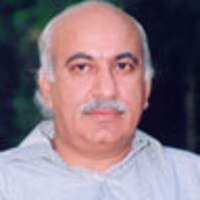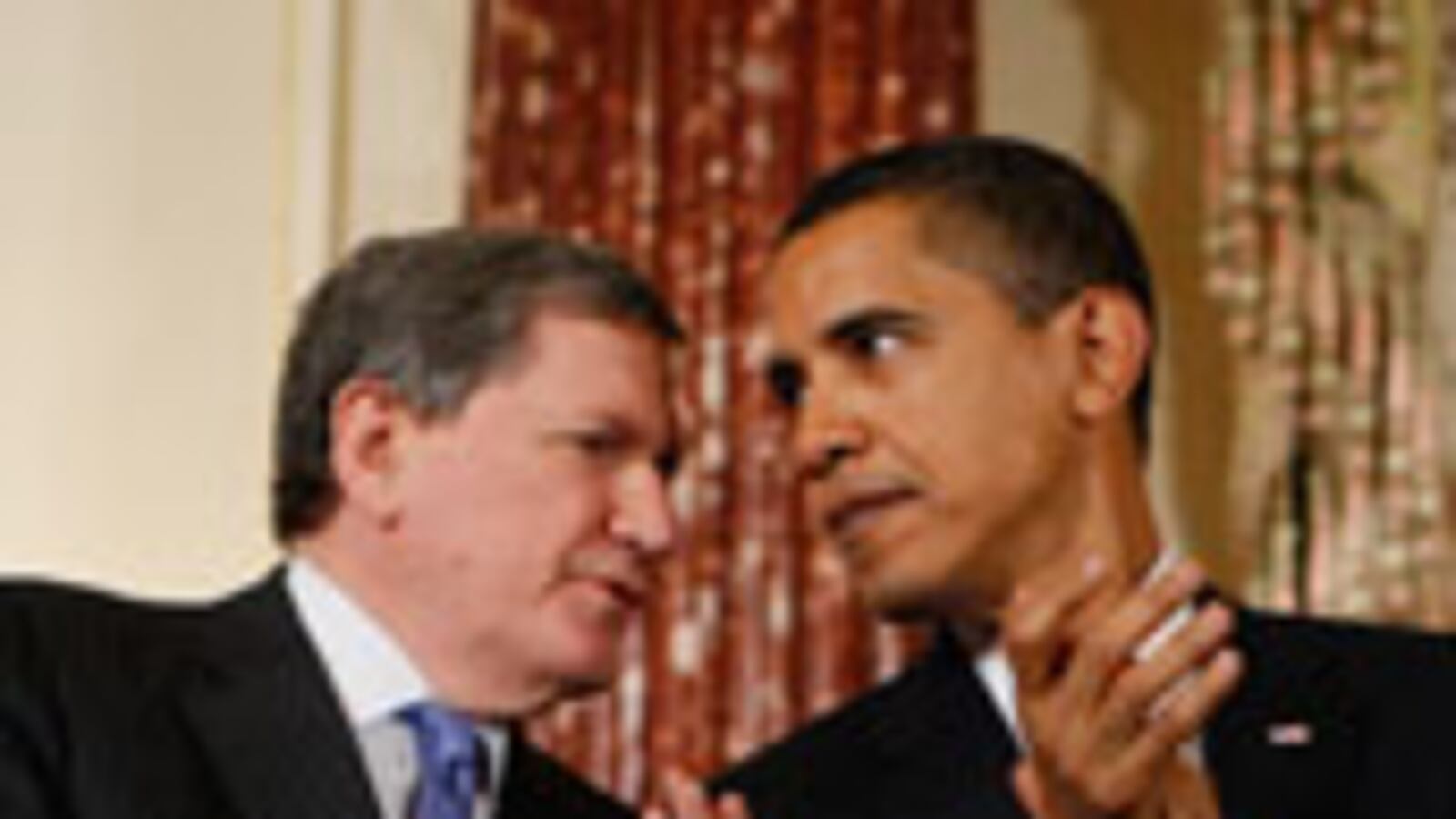
As President Obama sends conciliatory missives to Iran and provocative missiles into Pakistan—where US supply lines are being bombed by Taliban forces,and a US aid worker recently went missing—surely this irony is not lost on Washington: Precisely 30 years ago, when Obama was still in his teens, Iran became America’s most bitter foe in the Muslim world and Pakistan its most reliable ally.
On February 1, 1979, a cleric with deep-set eyes and deeper convictions, Ayatollah Khomeini, entered Tehran and turned the multi-dimensional upheavel that had just ousted the Shah into an Islamic revolution. Ten months later, students—among them, possibly, a young man called Mahmoud Ahmadinejad—took 44 Americans hostage and held them for 444 days.
Reagan-era Americans were great champions of jihad, and Reagan tended to measure patriotism by the length of the beard.
Also in 1979 Soviet troops marched into Kabul, launching the decisive phase of the Cold War in which Presidents Reagan and Bush would succeed in undermining the Soviet empire, in partnership with President Zia ul Haq of Pakistan.
Pakistan’s reward has been a regular infusion of funds for its military, consistent support for an erratic polity, and, most important, careful indifference while it developed nuclear weapons. Iran, in the same period, has been ravaged by an eight-year-war started by Saddam Hussein, relentless economic sanctions, near-pariah status in the West, and constant harassment in its bid to become the second nuclear weapons state in the Muslim world.
But now the battle lines have shifted dramatically. The “good jihad” that defeated the Soviets has become the “bad jihad,” with Osama bin Laden in a seemingly impregnable sanctuary within smelling distance of Pakistan’s famed intelligence service. Pakistan has turned into a toxic “jelly state,”which can neither turn stable nor disappear.
Although the Pakistan army is still in the trenches alongside the Pentagon, a growing swath of western Pakistan is now under the effective control of the Taliban, and the fabled province of Swat in the northern mountains has been virtually ceded to the Pakistani Taliban and its regressive social code. Tuesday’s bombing of a key supply route for US forces in Afghanistan was further proof that Islamabad has lost control of the region.
As special envoy Richard Holbrooke steps into territory that will make Bosnia seem like a kindergarten class, he must address a question that is asked each day on the streets of Karachi, Quetta, Peshawar and Lahore: Why is Pakistan fighting America’s war against fellow-Muslims?
The simplistic explanation, that the battlefield is a borderless region, is disingenuous. Street opposition to the US-Pakistan alliance extends far beyond the tribal-Pashtun areas. America recognizes who is its enemy in the region, but is less sure about what it is at war with: theocracy.
Two impulses led to the creation of Pakistan in 1947. The first was a demand for a homeland in which Muslims would not feel threatened by a Hindu majority. This movement was led by an Indian Muslim (and largely secular) elite. But a parallel ideology sought Pakistan not to protect Muslims but to save Islam—and Muslim politicians, otherwise secular in temperament, were happy to join the cry that “Islam was in danger” as an emotive shortcut to votes.
After 1947, the two viewpoints competed for space within Pakistan’s troubled constitution. While the secular elite sought a “Muslim” equivalent of India, with equality for all faiths, the Islamists demanded a nation that could become a faith-based Islamic fortress.
But by the end of the 1970s, Pakistan did not look like the sanctuary for Muslims its advertising had suggested. In 1971, Bangladesh was born when more than half of Pakistan’s Muslims, the Bengalis, demanded their own homeland. The '70s saw a revolt in Baluchistan which was ruthlessly suppressed by President Zulfiqar Ali Bhutto, and after his judicial assassination, Bhutto’s ethnic group, the Sindhis, felt increasingly like second-class citizens.
The new military dictator, General Zia ul Haq—initially derided in the West for usurping power and hanging Bhutto—was a fundamentalist by conviction. He used his 11 years in power to sell the concept that Nizam-e-Mustafa (Rule of the Prophet) was the only ideology that could define and protect Pakistan. Reagan-era Americans were untroubled by such exotica; in any case they were great champions of jihad, and Reagan tended to measure patriotism by the length of the beard.
So Zia was free to mould the state toward a theocracy, and extended the scope of “jihad” to proxy war against declared and undeclared enemies, including India. But it would not be too long before the West got scorched. Bill Clinton was president when the first bomb attack against the Twin Towers of New York came in 1993. The suspects took a PIA flight from New York to Pakistan that evening.
Now it serves Islamabad’s interests to deflect legitimate suspicions about the sharp rise in terrorist organizations like the Lashkar e Tayyaba, linking them to a “root” cause such as India and the Kashmir dispute. But the first war over Kashmir was fought in 1947; theocratic terrorists entered the battlefield less than 20 years ago. Many Pakistanis are finally beginning to admit, albeit privately, that these theocratic armies are as much a threat to civil society and democratic values in their own country as they are to India or the West.
The chief threat to Pakistan now is the siege within. A heady mix of Islamic ideology, increasing public sanctions and instability generated by corrupt and amoral conventional politics is feeding the rise of shadow armies who are certain that it is their moral duty to liberate their land from America and its allies. Theocracy is becoming synonymous with nationalism.
If he wants to defend his nation’s interests, Richard Holbrooke must arm himself with the right questions. The vital, immediate question is: How far has the theocratic contamination affected the Pakistan armed forces, including the officer level? The foot-soldiers entered service during the Zia years, and their social background is not very different from the groups that support and sustain theocratic notions. Being disciplined, they might obey orders but would not consider the Taliban an enemy in the way they viewed Russian soldiers.
It would be an exaggeration, however, to suggest that Pakistan’s nuclear assets are within reach of such ideologues, for its senior officers are a responsible group. But victory or defeat for Obama is going to be determined in the infantry war.
To be successful, Richard Holbrooke will have to square the most difficult circle in the world: He must unite Pakistan against the Taliban and then ally India with Pakistan and America in the war against theocracy. An unwritten law of history suggests that after six decades, de facto should be turned into de jure in terms of the border issues between India and Pakistan. Both should accept what exists, convert their Cease Fire Line into the international border, and freeze the past to protect their future.






